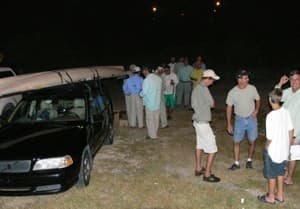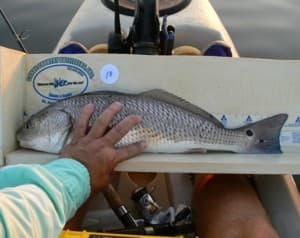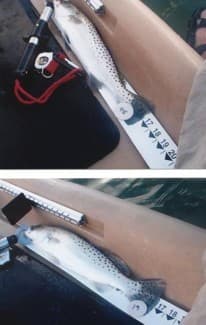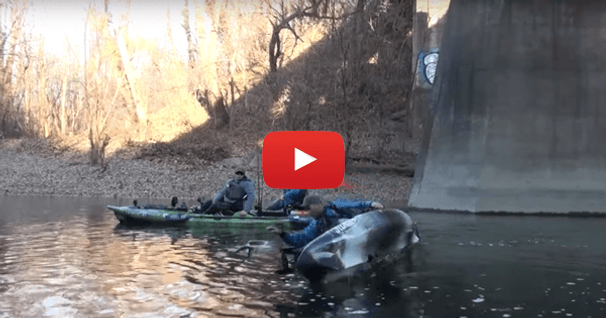The ONE Lure Challenge
By Jerry White
As with any sport, competition is bound to raise its ugly head sooner or later. Paddle friendly fishing tournaments are getting to be as popular as their fossil fueled counterparts. With that comes hefty entry fees, pressure to perform, and of course, professional anglers pre-fishing the week before the event. Stakes are high, so are expectations. That6's way too serious for many of us, but luckily there's an alternative.
Erick Bell has invented a paddle-only tournament series that makes it fun, challenging, and affordable … the "One Lure Challenge (OLC)". The best thing about his series is that on any given day, any one can win it. Whether you're a novice or a fully endorsed pro, the "One Lure Challenge" concept will help level the field.
THE CONCEPT:
By limiting the area to be fished, and selecting the lure to be used, each angler must use their knowledge to find and catch fish, rather than digging into the tackle box at every change in fishing conditions during the day. In order to make it more fun, the entry fee is only $10. News of this tournament series was started via paddle-fishing.com, but has spread all over Florida. Since the entry fee is so low, this allows many young anglers to participate. The more that compete, the larger the purse, since Erick takes no money for his efforts. Many seasoned paddle anglers bring rookie friends along, some even bring their significant others. The tournament series is more about meeting people with similar interests, fishing new places, and wearing those funny shirts with all the pockets.
THE RULES:
Eric decides months in advance what the one (1) lure will be. That's right, one lure. In most cases, each angler will be allowed to have spares, but even that number is limited. Eric also specifies the area that may be fished. This is a catch/photo/release event, and each angler is responsible for making sure that their pictures are of good quality. That means the picture must show the fish from nose to tail, on a legal measuring device, and with the anglers number shown. This is as hard as it sounds, but it's also part of the challenge of the tournament. Since these events are held in west central Florida, the target species are snook, redfish, and sea trout. Prizes go to the longest total of 3 fish, regardless of species. Prizes also go to largest fish in each category. Often there are other prizes too, for redfish with most spots, etc.
THE PRIZES:
1st place: 50% of the entry fees and a trophy (donated), and points. 2nd place: 30% of the entry fees and a trophy (donated), and points. 3rd place: 20% of the entry fees and a trophy (donated), and points.
The prizes in the largest fish category are normally donated by sponsors, and Eric is the master at finding such sponsors.
Since this is a series, points are accumulated all during the year, and at the end of the year, a grand champion is crowned. But, anyone that pays gets points. This is nice since there will be occasions when you can't make an event. At least this way, you can still get points in, while contributing to the pot. If you are there to compete you get more points. Obviously, if you place, you get even more points.
THE EVENT:
The participants meet at the designated area between 6:00 and 6:30 am. The sign-in area is always at a familiar launch within the designated fishing area. This works out great for those anglers that aren't familiar with the fishing area.

You can sign in at 6:01 am, and already have your boat rigged and ready to go, but no lines in the water until 6:30 am. The contestants are given a bag with a sheet of paper to tally their catches, a pen, and a poker chip with a number on it. The poker chip must be visible in the picture in order for the fish to be a valid entry. The entrants must be back at the pre-determined weigh-in location (normally a paddle-angler friendly restaurant, with cold beer) between 2:30 pm and 3:00 pm. Each angler will turn in their sheet, noting which fish they want to be considered for prizes. Each angler can only win in one category. Once the judges have reviewed the sheets, the top contenders will then be asked to provide pictures of their catches. It's up to each angler to make sure they have good pictures and also make sure they have proper cables/software so the judges can view them on a laptop. The proof is in the pictures.
THE PROCESS:
There will always be anglers that will call the designated area "their backyard". However, they're normally productive using lures of their own choosing and going there at the most productive times. The tables get turned when only one lure can be used, on a certain day, during a certain time. By the way, using any lure other than the designated lure is a disqualification. However, in my years of participating in these, I've never heard of anyone trying to bend that rule. Since this event doesn't normally draw the die-hard types, it stays low key, which runs the "fun" factor off the scale.
OK, let's go fishing. Most anglers have a defined strategy, based on tides, wind, solunar tables, sunspot activity, you name it. For me, all that goes out the window with the first cast. At that point, I'm just fishing. My wife normally participates as well, and we stay close in order to help each other in case a photo opportunity presents itself. Still, it's a tournament … time to get to work.
Job 1 - find the fish. I can usually do that. Job 2 - catch the fish. I can occasionally do that. Job 3 - photograph the fish. Oh brother. Let's spend a moment on this segment of the challenge. In golf terms, this would be the putt. The secret to life is not how well you do, it's how well you finish … and that definitely holds true here. In order for the fish to be "judgeable", it must be visible nose to tail with the unpinched tail showing the total length, measured on a legal measuring device, with the angler's poker chip in plain view. All this needs to be done regardless of waves and wind. You also need to protect that high-dollar digital camera too. Oh yeah, fish are camera shy by nature and will do their best to be uncooperative … that's the final variable to take in to consideration. But sometimes, it all comes together. Here's how the result looks.

Here, Peter Poletti used a high-res camera, which makes it easy for the judges to zoom in on that tail. Some anglers get very creative when it comes to ways to legally measure and photograph their catch with the poker chip showing. Some also invest in waterproof digital camera. All these things contribute to success.
THE WEIGH-IN / JUDGING:
It's all over now, except for the judging. The entries must be in on time, and as we discussed earlier, they must be of good quality. While the judges do their thing, it's a good time to met up with old friends, put faces and real names with those you only know from fishing forums, and of course, re-hydrate.
In the most recent OLC, the judges really got put to the test. There were 70 paid participants, and 67 actually showed up to fish. So there were a lot of tally sheets to wade through. Once that was done, the top contenders had to verify their sheets by producing the pictures. The judges had to make some very tough decisions on some of the pictures, due to quality (camera phone - unable to clearly see the length, etc.) and content (unable to see the entire fish, poker chip, etc). As a result the top 2 anglers were taken out of the running. Bragging rights are one thing, but in this case, it was costly as well.
- 1st place: $350
- 2nd place: $210
- 3rd place: $140
But, rules are rules, and they were applied fairly. No one doubts they caught quality fish, the pictures definitely showed that. But when it comes down to a photo finish, the photo is the final judge.
I know at my next OLC (Dec. 2nd), I'll have my photo/measuring gear in much better order. I only caught one fish at the last event. I caught it at about 7:00 am, on my way back from the launch (I forgot my measuring device). So I hooked a little trout, with my measuring device in my tankwell, my poker chip in my bag (which was in the pocket of my shorts), and my camera was in my dry bag. I was about as unprepared to record a fish as you can get. To make matters worse my photo wouldn't have been good enough for the judges to make a positive determination of length because of the angle I took it from.
MORE ABOUT JUDGING:
My wife and I participated in an OLC a few years ago. We both caught a number of fish, had a blast. I even won a $50 gift certificate from Hook1 (kayakfishinggear.com) at the weigh-in. But there was some controversy at the judging. Not at the OLC, but when we got home. I've enclosed a picture for your review. One fish was landed by yours truly, the other by my wife. Both fish were measured in my boat because it had a flatter cockpit. Which one is the larger fish, #45 (top) or #19 (bottom)?

Please go to "ARTICLE OPTIONS" at the bottom right side of this article, and click on "discuss this article". Let me know which fish you think is the winner.
MORE INFORMATION:
If you're ever in Florida when one of these events are scheduled, please participate. For more information on upcoming tournaments, or excuses (with pictures) about previous tournaments, check out: cybermessageboard.ehost.com/paddlef/viewforum.php?f=39&sid=121aa58ab8a260a1e4758fa5146b18da
Should you need additional information about the One Lure Challenge series, Erick Bell (forum name "Erick") can be reached via the link above.
See you out on the water...
Related Articles
The true story and life-saving lessons of Adam Irino’s very strange day. August 31, 2019 was shaping up…
As kayak anglers, you know you need to dress for immersion. But what do you do if you actually flip a…
In this video, we're going to look at the best way to re-enter a sit-on-top kayak in the event that…
In a broad sense, mankind has always found a way to wet a line, so in that regard, fishing from a kayak…



